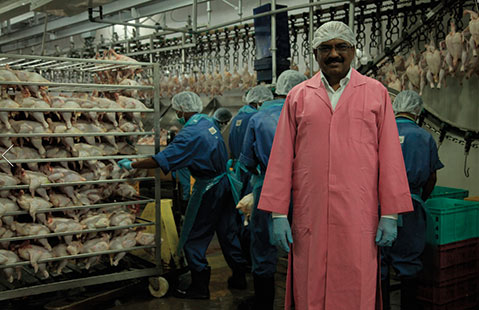‘10 Billion: What’s On Your Plate?’
Director Valetin Thurn

Unflinching. Exhaustive. Terrifying. Hopeful. These are the terms that best describe Valentin Thurn’s documentary, which explores the complex intersection of global population, food supply, farming, and social justice.
U.S. PREMIERE
See www.10milliarden-derfilm.de.
What was your primary motivation for taking on a project like this?
My interest for our nutrition actually started at supermarket trash bins. When I did my first cinema documentary “Taste the Waste” (SBIFF 2011), I asked myself why corporations throw away good food when at the same time people are starving? I discovered that indeed our consumption patterns and the worldwide food crisis are closely connected.
If you had to boil it down to one thing, what would you say is the average person’s biggest misunderstanding about food?
Good food does not always look shiny. It is because we are so focused to buy the perfect looking things that we forget about what should be our real focus: Taste. In the process of doing this, we create mountains of food waste around the world.
What was the most surprising/disturbing thing you found while working on this film?
That the middle class of the developing world has started to copy us and eat more meat. The feed production required for this, primarily soybeans, is the number one reason why small farmers in Latin America, Africa and South Asia are driven off their land. That’s why our meat consumption in the first world is directly linked to hunger.
What is the biggest issue facing food security in your opinion?
It is not the growing world population! Certainly the number of people cannot grow and grow forever. The growth will end by the middle of this century and the 10 billion number will be the top. But more important than the number of people is the way we are producing food for them. The biggest impact on the world’s environment comes from the fertilizers and minerals used in farming as well as artificial nitrogen that creates dead zones in the oceans. These are the main reasons why our eating habits contribute so significantly to climate change.
What is the most hopeful thing you found?
There is not just one big solution, but many small ones. Agriculture and food security need local solutions and, no matter where you go, there is a movement there of conscious people who are working on it.
Tell me a little bit about the behind the scenes research that was needed for 10 Billion. How did you find your farmers etc?
When it comes to small farmers, you need a local guide and time. It is not possible to find them on the internet. When it comes to the big fish, you need a different kind of preparation, meetings with people that can connect you and lots of traveling. In all cases, I, as the director, need to do those things personally because it is the personal impression that decides if they trust me enough to work together.
After working on this movie, do you think we can do it? Will we find the right way forward?
We are already producing enough food for 12 billion now, so, when it comes to the quantity, yes, we can produce enough for everybody. But when it comes to distribution, I have my doubts it will work because already we are unable to distribute food in a fair manner and I don’t really see a political will of the big players to change this. What western governments destroy with their trade politics cannot be repaired by their little bit of development aid. For instance, they force African governments to open their markets for food from Europe or North America and, in the process, destroy local farmers and, in the process, destroy that country’s ability to produce enough in times of a crisis.



